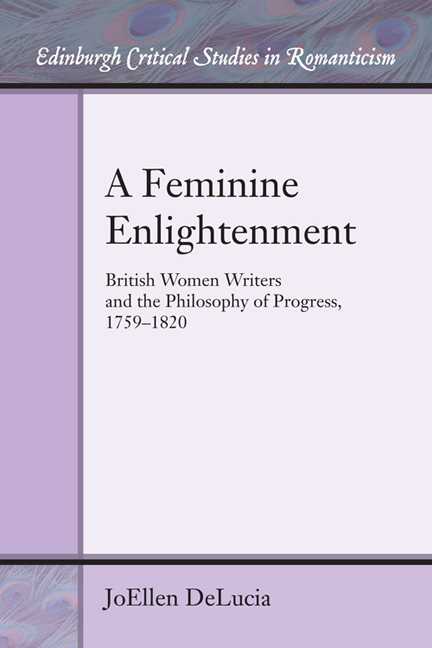Book contents
- Frontmatter
- Contents
- Acknowledgments
- Introduction: A Feminine Enlightenment?
- 1 The Progress of Feeling: The Ossian Poems and Adam Smith's Theory of Moral Sentiments
- 2 Ossianic History and Bluestocking Feminism
- 3 Queering Progress: Anna Seward and Llangollen Vale
- 4 Poetry, Paratext, and History in Radcliffe's Gothic
- 5 Stadial Fiction or the Progress of Taste
- Epilogue: Women Writers in the Age of Ossian
- Bibliography
- Index
Epilogue: Women Writers in the Age of Ossian
Published online by Cambridge University Press: 05 August 2016
- Frontmatter
- Contents
- Acknowledgments
- Introduction: A Feminine Enlightenment?
- 1 The Progress of Feeling: The Ossian Poems and Adam Smith's Theory of Moral Sentiments
- 2 Ossianic History and Bluestocking Feminism
- 3 Queering Progress: Anna Seward and Llangollen Vale
- 4 Poetry, Paratext, and History in Radcliffe's Gothic
- 5 Stadial Fiction or the Progress of Taste
- Epilogue: Women Writers in the Age of Ossian
- Bibliography
- Index
Summary
This book has explored alternatives to antagonistic narratives of women writers and Enlightenment thought. Women did not, for the most part, write philosophical treatises or political pamphlets, but their literary endeavors made charting historical and social progress during the Enlightenment a cross-cultural and comparative exercise. Their work also popularized Enlightenment historiography in novels, poetry collections, and even in the periodical press. A timeline published in December of 1773 by The Lady's Magazine, perhaps the most popular and longestrunning women's periodical in the English-speaking world, testifies to women's widespread engagement with shaping historical accounts of progress. In “A Chronological Account of the most remarkable Discoveries in the Arts and Sciences,” Sophia Amelia, a pseudonymous contributor, makes a claim for women as particularly positioned to develop a global history of the arts. She describes her history as
a chronological series of events, which very few of the gentlemen know any thing of, and if in boarding-schools my own sex would amuse themselves with the following table by questions and answers I am confident they would puzzle one half of the curates, and six-eighths of the rectors and vicars in the kingdom.
Beginning in 1900 bce with Abraham, “in whose time sculpture was supposed to be invented,” and ending in 1763 ce, the timeline concludes with “Harrison, an Englishman, [who] constructed an instrument to find out the longitude,” making it possible to apprehend the world as a uniform space. Significantly, Sophia Amelia's account of humankind's progress breaks national boundaries and ranges widely across temporal and geographic divides. As well as including aesthetic and moral milestones, such as “700 [bce] Archilochus, inventor of iambic verse … 500 [bce] Confucius, the Chinese moralist … 1025 [ce] Gui d’ Arezzo, invented musical notes,” Sophia Amelia mentions Hippocrates, John Harvey, and Isaac Newton. A recent invention of Joseph Priestley, the timeline attempted to represent universal history. Sophia Amelia's basic chronology aspires to universality and also reminds readers of the social histories of the Scottish Enlightenment, which blended commercial advances with artistic and moral developments, such as 527 bce, when “the first silkworm eggs were brought to Europe,” and 1702 bce, which marks “the invention of Dresden china.”
- Type
- Chapter
- Information
- A Feminine EnlightenmentBritish Women Writers and the Philosophy of Progress, 1759-1820, pp. 187 - 192Publisher: Edinburgh University PressPrint publication year: 2015



